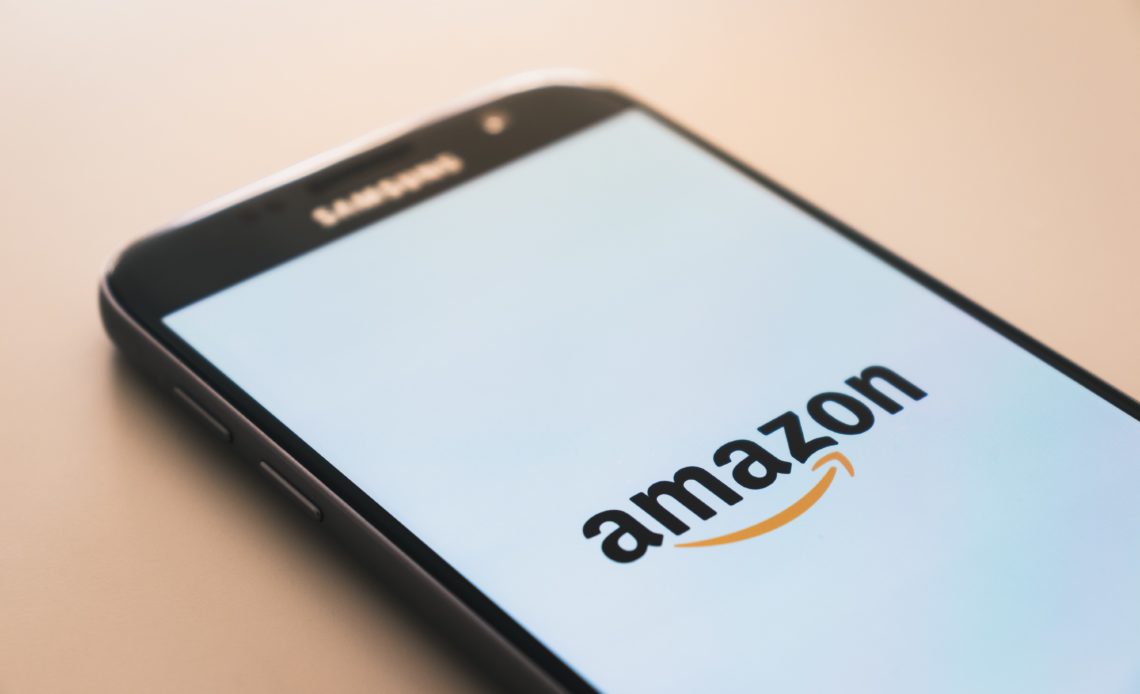
Summary
We investigated five companies selling health and wellness products on Amazon. Our findings include:
- Dishonest supplement companies who hide—or lie about—their identities and locations being allowed to advertise on Amazon, and getting “Amazon Choice” badges
- Amazon awarding “Amazon Choice” badges to supplements with misleading labeling
- Amazon awarding an “Amazon Choice” badge to a supplement that may not include the ‘active ingredient’ of the supplement
- Amazon ranking supplements with a “majority fake or misleading reviews” (according to Fakespot) high in their search results
- Amazon allowing a company to sell diet pills without providing an image of the ingredients label
- Amazon allowing a company to sell a Vitamin C supplement with a “majority fake or misleading reviews” (according to Fakespot); presumably some people are buying Vitamin C for COVID-19 immune support
Scroll to the section “Five Examples of Sketchy Amazon Sellers” below to read more.
Most people have a general idea that Amazon sellers aren’t always very reliable–but do you know how to spot a scammy company on Amazon?
With Amazon supplements and Amazon vitamins in particular, how can you know that what you’re putting into your body is safe? How do you know that the company selling it is honest?
In this article we’re going to explain nine things to watch for that indicate that a company might not be honest or reliable. Then we’ll go over five examples of companies that range from questionable to scammy, and show you what “tells” gave away that they might not be companies you want to buy from.
How To Spot Fake Supplements On Amazon: Nine Red Flags to Watch Out For
These red flags may suggest that the company isn’t being forthright about what’s in the product, or who they are, or where they are.
Ultimately though, what’s really important is the quality and safety of the company’s products, and the main reason to be wary of these red flags is because they each give you reason to doubt that a company has good quality control or customer service measures in place.
This is particularly important when it comes to dietary supplements. After all, you should be very careful about what you put into your body.
Note that it is perfectly normal for good companies to employ a contract manufacturer rather than doing manufacturing themselves. A company that does this needs to at least have the resources and willingness to monitor its contract manufacturer and the quality of its products, and that’s hard to do when the company is just one or two people.
Unclear Ingredients Or Product Specifications
If you’re buying a dietary supplement, the product description should say how many milligrams of each ingredient it has, and how many milligrams–or what percentage–of the active ingredient that equates to. For instance, if you’re buying rhodiola rosea, the nutrition label should say not only how much rhodiola rosea it contains, but also what percentage rosavins and salidrosides it contains, because these are, effectively, the active ingredients in rhodiola rosea.
Beware of supplements that elide the distinction between how much each pill weighs, vs. how much of the actual ingredient the pill contains, vs. how much of the whole plant that’s equivalent to. NusaPure’s rhodiola rosea product is a great example of a supplement you might think twice about—it lists a huge milligram number on the front that ostensibly represents each pill’s equivalence to how much “fresh Rhodiola Rosea Root” it contains. This is not very meaningful—it is not common practice to eat the root of rhodiola rosea whole. In reality, the “4,800” number is probably there to convince shoppers they’re getting more for their money. As well, the ingredients list doesn’t show how much rosavins and salidrosides the product contains.
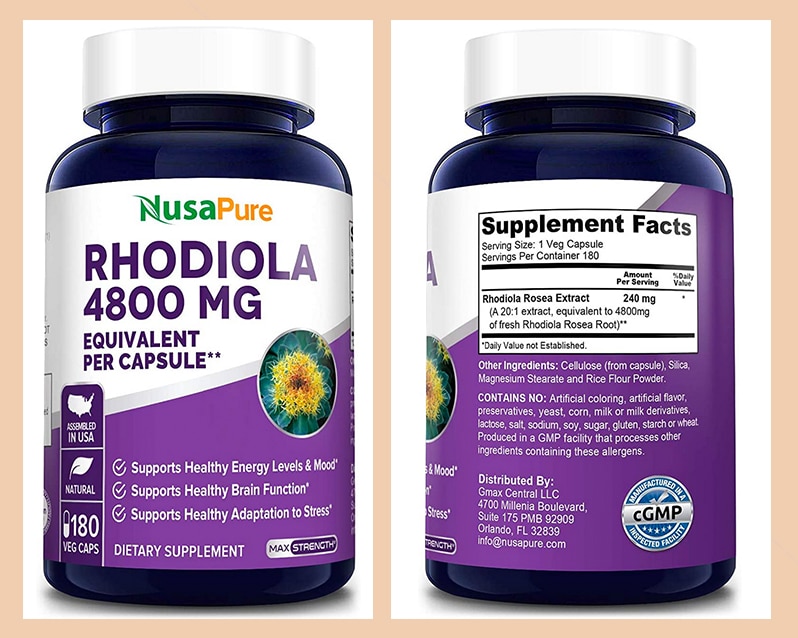
Alarmingly, their product is “Amazon’s Choice” for rhodiola rosea searches.
If you’re buying something other than supplements, the product page should be clear about the materials used, the weight and dimensions, and anything else clearly relevant to your purchase decision. A screen protector should say what the length, width and diagonal dimensions are, and which devices it will fit. Blue-blocking glasses should give some idea of how dark they are, and whether they’re intended more for daytime or nighttime use, for example.
The Company Sells A Weird Assortment Of Products
By weird, we mean that they sell products in completely different categories. There are some companies on Amazon that sell both dietary supplements and baby toys, for instance, or exercise equipment and non-workout clothing.
This is a dead giveaway that the company in question is a reseller, rather than the original manufacturer of the items it sells. We believe resellers may not have the means for proper quality control on the things they’re selling; selling disparate products also begs the question—how much of an authority on the product could they actually be?
We feel most comfortable buying Amazon vitamins and herbs when we know the company is staffed by experts in nutrition, chemistry, etc. Therefore, if you come across an Amazon seller that sells a disparate set of products in different product categories, consider how that might affect the product’s quality control and the company’s trustworthiness.
Non-Specific Guarantees
Guarantees, or warranties, are generally good. But a guarantee doesn’t mean anything if you don’t know what’s being guaranteed.
“If it breaks within the first year, you get your money back.” “If it doesn’t work, you get your money back.” “If you’re not satisfied, we’ll refund you, no questions asked within the first 30 days of purchase/delivery.” Those are good guarantees.
Some companies, though, will advertise something like a “manufacturer’s guarantee” without saying what’s actually being guaranteed, or whether it entails being able to request a refund if said guarantee is not met. These are not good guarantees.
Fake Reviews
You probably know these when you see them, but a few things to watch for:
- Extreme enthusiasm combined with a lack of details
- The person who wrote the review has either only reviewed that one product, or has written a lot of reviews and every single one is five stars
- Reviews are either five stars or one or two stars, never three or four stars, and the bad reviews are better-written than the good ones
- Poor or incoherent phrasing, particularly if the product seems to only be available in the U.S.
Two additional tools are useful for this purpose.
First there’s Fakespot, which uses an algorithm to scrape reviews and detect how many of a given product’s or company’s reviews seem fake. Products are then assigned a letter grade, A through F, based on what percentage of reviews seem real.
The word choice used in individual reviews is apparently taken into account; beyond that, Fakespot is secretive about the exact variables used by its algorithm, as review farms could potentially try to game the algorithm if they knew how it worked. Fakespot does have stated policies regarding a few particular types of reviews; unverified, Amazon Vine, and Amazon Discount Disclaimers reviews are always flagged as unreliable, while verified reviews are usually marked as reliable.
Not every company is listed on Fakespot, and you do have to make sure you have the right company; there are a lot of sellers with similar names. In the absence of a clear explanation for how the algorithm works–and in particular, how well it distinguishes real reviews with poor English from fake reviews–our inclination is to view even a C rating as acceptable, if not exactly ideal.
The second tool we recommend is ReviewMeta, which takes a very different approach than Fakespot. It starts off by using a similar algorithm for analyzing review credibility, but instead of simply telling you how many of a product’s reviews look real, it aims to calculate what a product’s Amazon review score “should” be based only on real reviews. It does this by subtracting back out the fake reviews, while reducing the weight given to borderline reviews–so not all reviews that are kept in its adjusted score count equally.
The two tools don’t always give you similar results–some products score poorly on Fakespot, but do alright on ReviewMeta because, for example, they have a lot of fake reviews but are nonetheless well-reviewed by real customers. Others do worse on ReviewMeta, as borderline reviews that looked real to Fakespot are given lesser weight, but not taken out completely, by ReviewMeta.
The Company Has No Presence Off Amazon
A company should have a website, and it should come up if you Google the name of the company. Other places to look might include LinkedIn, Google Maps to find the company’s office, or business directories such as Dun & Bradstreet.
If a company doesn’t seem to exist off of Amazon, it is probably tiny and hasn’t been around very long, or alternatively is using a fake name on Amazon to disguise it’s real identity.
It’s Unclear Who Owns/Manages The Company, Or Where It’s Located
There should be some indication of this on the company’s website and/or Amazon store page. Look for the address of the company office, names of the leadership team, and a company history saying who founded it and when. If there’s no indication of who you’d be buying from, be wary.
Lack Of Third-Party Verification
This is mainly an issue with dietary supplements. There are independent labs that supplements can be sent to in order to be tested and have their contents examined to see whether a) the supplement contains what it says it does, and b) it has toxins like lead or ethanol.
A good supplement company will regularly send its products to these labs for testing, and post the test results (known as a certificate of analysis or CoA) on its website. Be wary of companies that don’t do this.
Here’s an example of a CBD company doing it well–note how their certificates of analysis are all organized and easy to find. Also, when you look at a specific CoA, it identifies the laboratory and when the product was tested. Be wary of companies with CoA’s that don’t say which lab did the analysis.
With non-supplement companies, you don’t need to be quite as wary, but should look for something about safety, manufacturing practices, compliance procedures and so on. The compliance page for Philips Inc. is a perfect example if a company doing this right.
The Website Is Owned/Registered/Hosted In A Different Country Than The Country The Company Says It’s From
If a company does show some indication of who and where they are, it still might be a lie. There’s an easy way to check.
Go to ICANN and look up the registrar of a website. Then go to Hosting Checker to find the hosting service and location of the server. In fact, test them both out right now by looking up a website of your choice.
Note that many websites will have private registration that hides the name of the owner; this is perfectly normal. What you should be looking for are the names and locations of the hosting and registrar services, and whether they’re reputable companies that provide clear methods for reporting abuse or scams by their customers.
If a company claims to be in the USA but is registered in China, hosted in the Cayman Islands, or anything like that, be wary. And if the host or registrar don’t have a “report abuse” page or something to that effect, be extra wary.
Five Examples of Sketchy Amazon Sellers
These are examples of what looks sketchy. We can not say definitively that any of the companies below are untrustworthy. It’s possible they’re trustworthy, and just need to be more clear about their operations to earn our trust.
Companies we would not trust come in a few varieties. There are many sellers that have no presence off of Amazon, and you can’t tell who they are. There are companies that claim to be American, but don’t really seem to be (of course, it’s fine not to be American. But it’s not fine to lie to people who are thinking about buying your product). And then there are companies that look truly legit, until you really dig into their products and marketing copy.
Vita-Way Resells Coronavirus-Related Supplements That May Have Mostly Fake Or Unreliable Reviews
Vita-Way is a reseller, albeit transparent about it. It does not appear to have a presence anywhere outside of Amazon; we found companies with similar names like Vita Labs and Vita Living, but they seem to be unrelated. Its products are fulfilled by Amazon, and every brand it sells offers wholesale prices, so it looks like Vita-Way is buying supplements wholesale and reselling on Amazon.
Our issue with Vita-Way is not that it’s a reseller. Our issue is that numerous supplements it sells have majority fake or unreliable reviews, according to Fakespot analyses. Fake or unreliable reviews are a problem for any product, but they’re especially concerning when the fake or unreliable reviews are on a product people are buying to put into their bodies, to address potentially serious health issues.
Incredibly—and alarmingly—some of the products Vita-Way resells that receive an “F” rating on Fakespot are “Amazon’s Choice” for that category of product. For example, the company sells NASA Be’Ahava’s 1500 mg S-Adenosyl Methionine (SAM-e), a supplement people take to reduce symptoms of depression as well as osteoarthritis. While Fakespot rates the reviews on NASA BeAhava’s SAM-e 1500 mg supplement as an “F”, and just 30% of the reviews on its product page as reliable, Amazon gives the supplement its “Amazon Choice” badge.
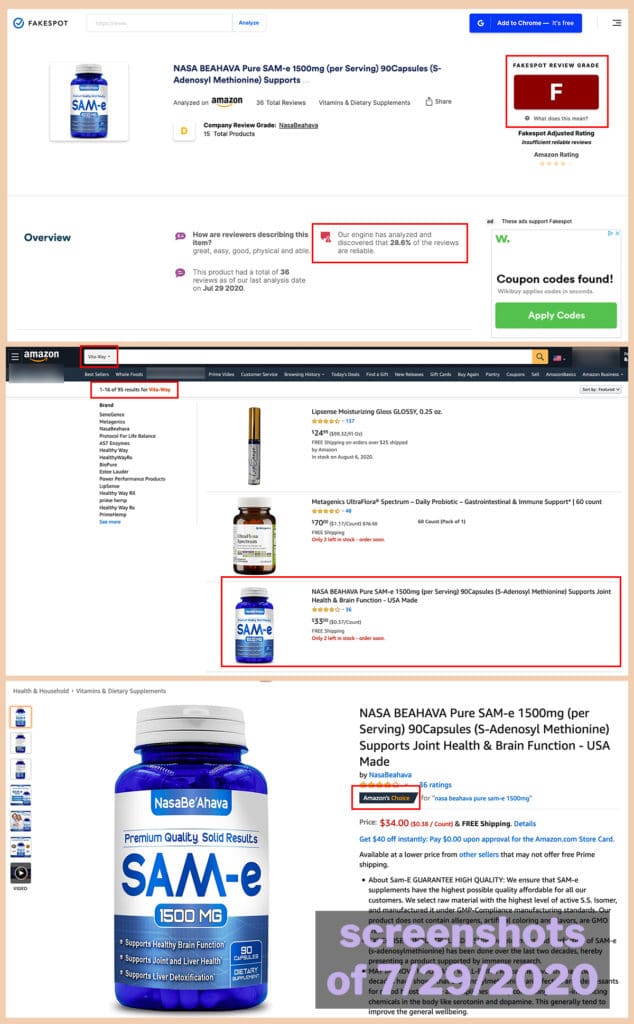
Just as worrying is the fact that Vita-Way is selling Vitamin C, a supplement related to immune support, that people right now are almost certainly buying to protect themselves against coronavirus. According to a Fakespot analysis, most of the reviews on this supplement are unreliable. However, ReviewMeta leaves Amazon’s rating unchanged—indicating less deception involved—but “warns” about “suspicious reviewers” and “rating trend”.

We want to make clear again that we do not have any issue with resellers on Amazon, despite that reselling can, in certain cases, obscure information about who is accountable for the quality of products on Amazon. Our concern is the potential deception some resellers might employ to get their products to the top of Amazon search rankings, and how that could come at the expense of shopper health.
NusaPure‘s Executives Have Unusual Backgrounds For Being At The Top Of A Health And Wellness Brand
NusaPure sells its own branded products, which have overwhelmingly positive Amazon reviews, and tend to have bad ratings from Fakespot. We believe poor Fakespot analyses are problematic, but they’re especially concerning when there’s a combination of poor Fakespot analyses and anonymous or partially-anonymous company execs/ owners.
The about page on NusaPure’s website lists the executive team by first name only—Cedric, the founder, and Milen, the Vice President. NusaPure maintains only a virtual office address, a service that, depending on your plan/provider, provides a mailing address (e.g., for putting on your website), access to meeting spaces, and other features for a nominal fee, but not traditional office space for daily use by organizations. Their website also uses the Provely widget, which generates a notification every time the website makes a sale, visible to the user. Depending on the plan, Provely displays sales in real-time or will “display past, historical lead, or sale notifications…perfect for small volume and startups who don’t get daily sales…but have had past sales.”
We did find Cedric on LinkedIn (“Cedric L.”); given his job history, he might be Belgian. Cedric has a total of 1 skill endorsement from someone named Milen Kolev, perhaps the Vice President, per NusaPure’s about page. However, Milen appears to have been the franchise owner of a Florida pizza chain called Westshore Pizza since 2007. According to LinkedIn, both Milen and Cedric live in proximity to each other in or near Tampa, Florida.
Combing through NusaPure’s site, as well as their Amazon product pages, we were unable to locate certificates of analyses, nor find mention of them. Some of NusaPure’s supplements–mainly the herbal extracts–are also confusingly labelled, with a big number on the front that doesn’t represent how much the supplement weighs.
For instance, as we mentioned eariler, their rhodiola rosea supplement says 4,800 mg equivalent per capsule on the front. However, you have to look at the nutrition information to see that it actually contains only 240 mg of rhodiola rosea extract, which is allegedly equivalent to 4,800 of “fresh” rhodiola rosea root. We have never heard of anyone taking “fresh” rhodiola rosea; “4,800” is more likely a ‘decoy’ figure to trick shoppers into thinking they’re getting a more of the supplement than what’s on offer from competitor brands.
NusaPure also doesn’t list what percentage of rosavins and saldrosides, the active ingredients of rhodiola rosea, their rhodiola rosea supplement contains. So not only is the front label misleading, but there’s ultimately no way to gauge the potency of this product. And like we said earlier, perhaps the most concerning thing about their r. rosea supplement is that despite its labeling issues and potential lack of active ingredients, it has the “Amazon’s Choice” badge.
NusaPure looks legitimate at first glance, but we’re not so sure. We are not against entrepreneurial side businesses; we are concerned when it might be true that companies selling health cures obscure the identities of their leadership teams. Of course, we also dislike confusing labeling, which, in our estimation, NusaPure has too much of, and may well know it.
Amazon Is Allowing Homy International To Advertise Despite Appearing Deceptive About Their Identities, Size, And Location

Homy doesn’t sell supplements, but they do sell products to shield your eyes from blue light, which some people associate with sleeplessness and headaches. We became aware of Homy when we were researching for our review of blue light blocking glasses.
Homy is an operation that is not quite “fake,” but it doesn’t seem to be totally honest, either. Homy sells a variety of screen protectors, keyboard covers and the like. Its Amazon page looks professional at first. But look closer and a few flaws become apparent.
First, weird phrasing like “invested in continuous improvement and the development” or “fighting with myopic deepening” is littered throughout the page.
Second, their Amazon page has some images at the bottom, including one that says “Contact Us,” that look like they should be clickable, but aren’t. This creates the illusion of a contact page, but in fact there is no obvious way to contact them.
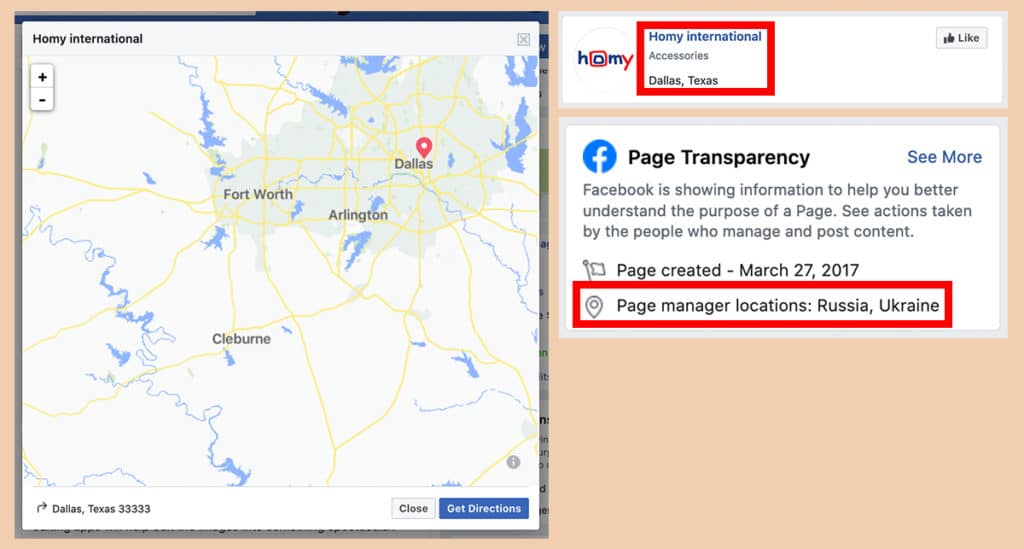
Homy does have a website, but notice the combination of claims that they have offices around the world but no addresses for those offices, and nothing about who their leadership team is despite allegedly being a fairly large company. For example, this is the first slide on their “Our story” section:

They refer to the founder as “Company owner (CEO)”—pretty unusual; we also suspect the image is a stock photo, but a reverse image search doesn’t turn anything up, so we can’t verify that.
The more we looked into Homy, the more alarmed we became. We are especially concerned because Homy’s products aren’t buried in Amazon’s search results. With some searches, such as “blue light screen protector”, Homy has the first product in the search results because it’s targeting ads at that search as of July 29, 2020.
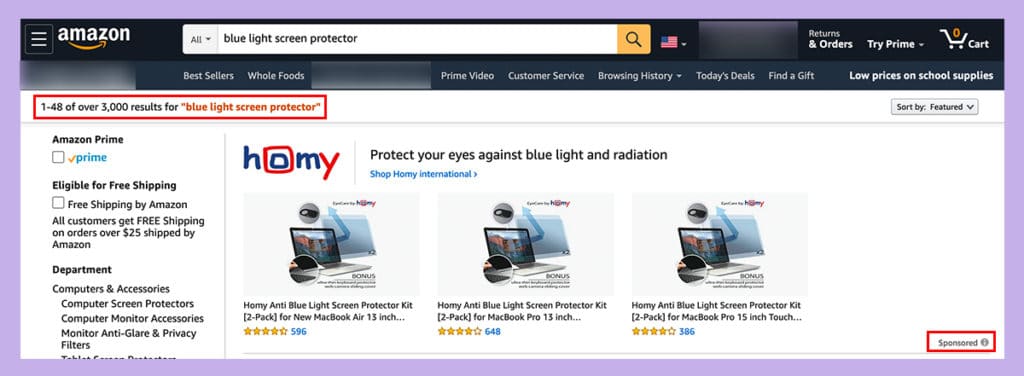
We don’t have Amazon search volume for “blue light screen protector,” but according to ahrefs.com, an industry-leading SEO tool, “blue light screen protector” gets 1,600 Google searches a month. And in fact, the very first Homy product that appears in this search is listed as “Amazon’s Choice”. In 2019, Amazon told Buzzfeed that this label exists “as a way to simplify shopping for customers by highlighting highly rated, well-priced products ready to ship immediately for the most popular searches on Amazon.”
We can’t make any claims about the efficacy of Homy’s products; maybe they work, maybe they don’t. To be fair, the Homy products we ran through Fakespot appear to have mostly legit reviews, with “minimal deception” involved, and the reviews are enthusiastic. We’re including the company in this piece because, quite clearly, something is afoot—when they won’t tell us who their CEO is, struggle to put a coherent sentence together, and list their location on Facebook as Texas, but manage the page from Russia and the Ukraine, we presume there is something unusual about this company. And, again, it’s concerning that a company of this repute is appearing first on Amazon searches with presumed significant volume.
Shape & Shine’s Diet Pill Proprietary Blend Obscures Its Ingredients List, Many Of It’s Reviews Are Likely Fake Or Unreliable, And The Company Seems To Be Completely Anonymous
We don’t think it’s a good idea to buy supplements that aren’t clear about what they contain. Here at The Unwinder, we frequently criticize brands for listing ingredients without being clear about how much of the active ingredient a product contains.
Shape & Shine’s (or just Shape Shine; the naming is not consistent) sole product goes a step further.
On their website, there’s no list of ingredients for their single product: diet pills. In fact, as of this article’s publication, nowhere on Shape & Shine’s entire website does it say what ingredients the product actually contains. The Amazon product page does have a picture of the nutrition label on the back of the bottle, though. However, because Shape & Shine’s diet pills are a proprietary blend, we don’t know how much of each ingredient listed on the label is present. Needless to say, there are no certificates of analysis either.
Equally concerning is that there is no indication whatsoever of who runs the company or where it’s located. The website is registered in Russia and hosted in Switzerland, despite the fact that the Amazon product page says its made in the USA. We could not find the company, or any employees of the company, on LinkedIn.
Fakespot, unsurprisingly, gives Shape Shine an F. Similarly, ReviewMeta’s “Report Card” gives Shape Shine a “Fail”.
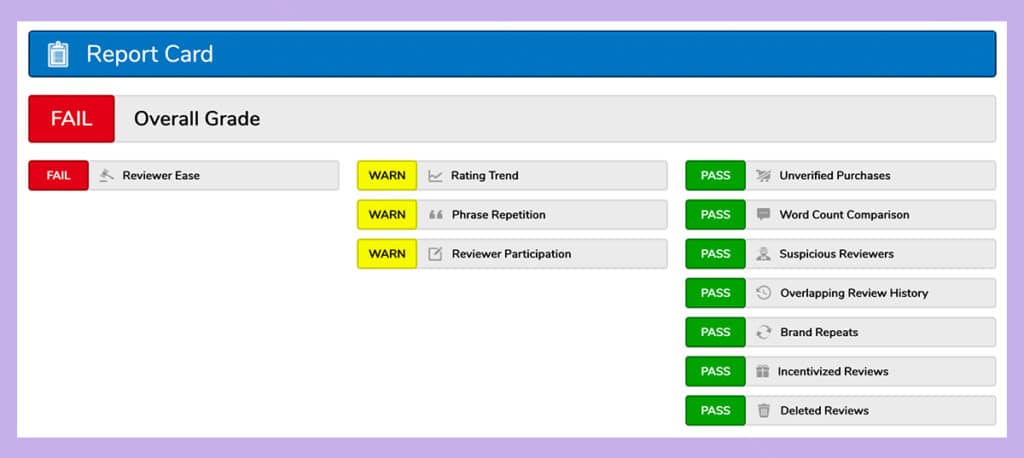
Most alarming, though, is that Amazon is allowing a company like Shape & Shine to advertise a product that isn’t clear about what it is they’re selling, and seems like it’s being deceptive about who they are. Our search of “weight loss pills” turned Shape & Shine’s product up on the first page.
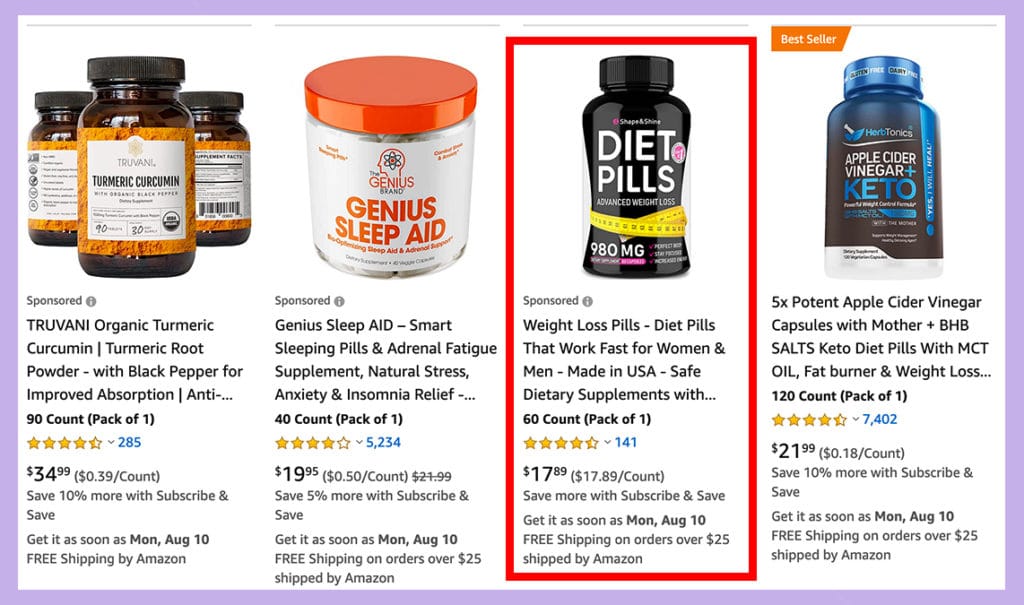
This is just about a perfect storm of everything you might want to avoid: a product with unclear ingredients and no safety precautions, propped up by potentially fake reviews, made by a company with unknown management.
Amazon Is Allowing Natural Keto Health To Sell Weight Loss Pills Without Showing Customers The Ingredients Label
Natural Keto Health sells six different brands of weight loss supplements. Neither Natural Keto Health nor any of those six brands appear to have a website or off-Amazon presence. It is therefore unclear whether Natural Keto Health produces or merely resells those six products. A quick search shows other sellers selling products with the same names and general descriptions, but different labels and photos. For example, one of their products called “Radiantly Slim” shares its title with at least two other products in the diet pill category.
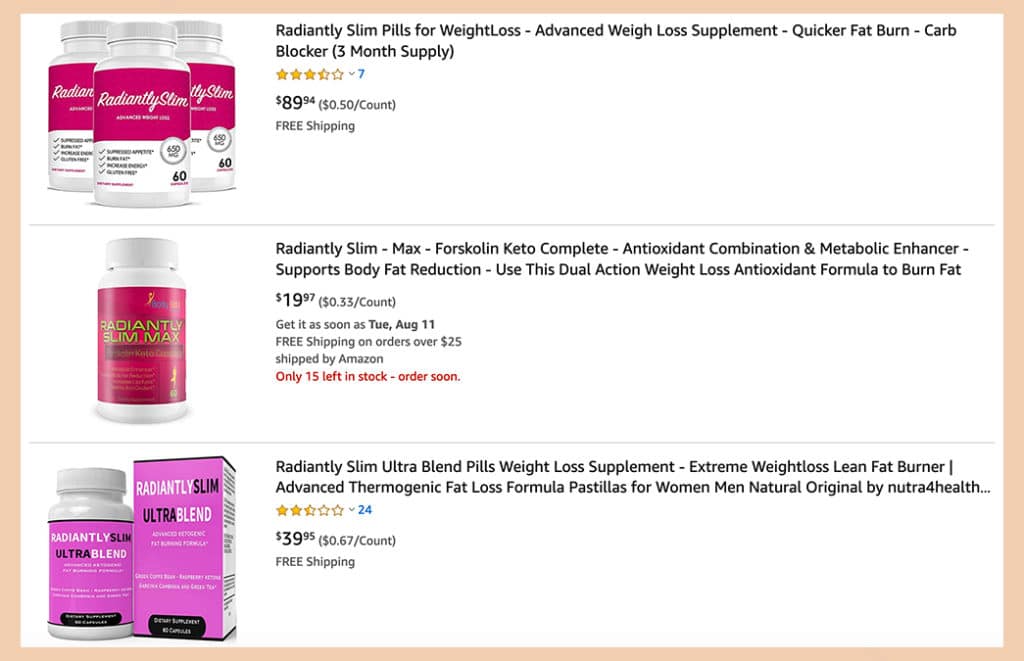
Of the six products, four have F ratings from Fakespot, one has a D, and one has an A. At the time of the publication of this article, only two of the six products include photos of the nutritional label. We could not find lab tests, safety assurances, or third-party verification of any kind.
For example, an image of the ingredients/ nutritional label for “Keto Advanced Weight Loss” pills is not on the Amazon page. Further down the page, under an easy-to-miss section called “Important information,” it says “Ingredients: BHB Salts, Caffeine”. Even further down the page, an Amazon shopper uploaded photos of the presumed ingredients label, which itemizes the BHB salts and caffeine, but also includes other ingredients such as magnesium stearate, gelatin, and rice flour.
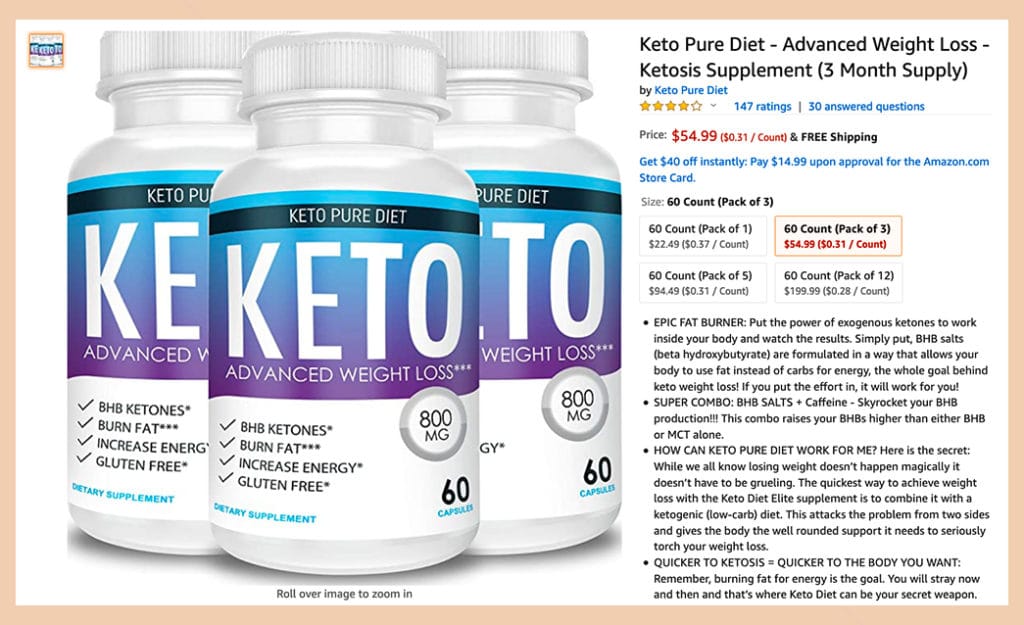
This is another case where it may be unclear what you’re buying or who you’re buying it from; without a website to examine, we don’t even know what country Natural Keto Health is located in.
Editor’s note: We do not receive affiliate commission from any of the links in this article. We also marked all links to the companies mentioned in this article “nofollow”.